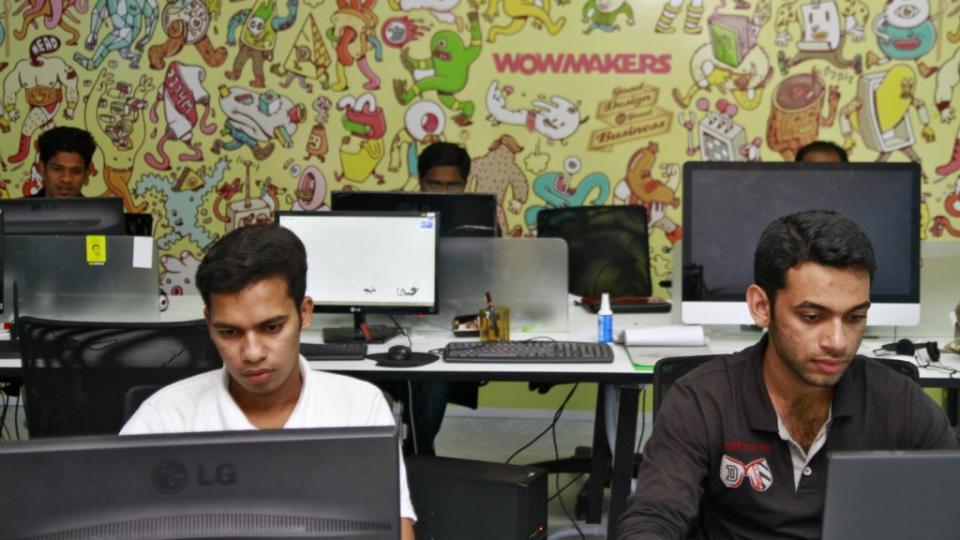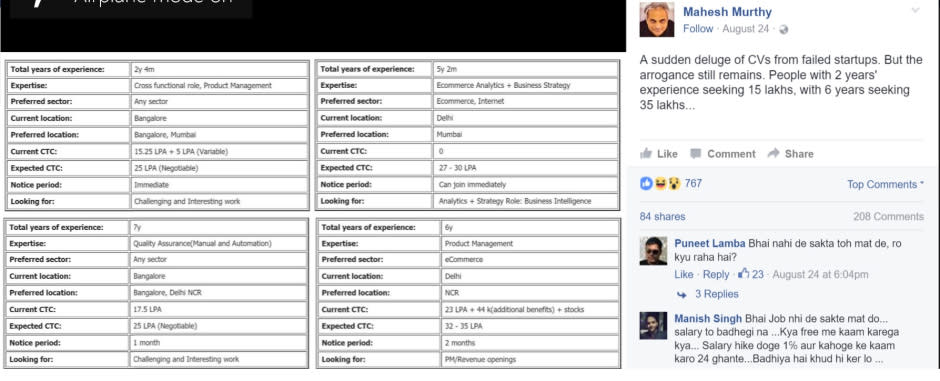What gloom? Indian startups are still throwing ridiculous amounts of money to woo talent

It’s been a difficult year for Indian startups. From shutdowns to layoffs, the ecosystem has seen a complete reversal of fortunes since January this year.
But there is one thing that hasn’t changed: hefty salary packages.
Well-funded technology startups have been among India’s top recruiters over the last few years. They dominated campus placements, hiring in big numbers and offering massive pay packages that sometimes went up to between Rs50 lakh and Rs70 lakh per annum. They also poached from other industries at huge premiums. Flipkart and Snapdeal have both hired ex-Silicon Valley executives with salaries anywhere between Rs1 crore and Rs5 crore per annum.
However, some in the Indian startup ecosystem have now begun speaking out against these unreasonable salaries.
In a Facebook post on Aug. 24, Mahesh Murthy, co-founder of startup investment firm Seedfund, shared parts of the resumes of some former employees of failed technology startups. All of them, irrespective of their profiles, seemed to expect jaw-dropping remunerations.

Screenshot of Mahesh Murthy’s post on Facebook.
“There’s an obscene amount of money being charged by the mercenary generation. For startups, the money should come at the end of the successful process. You have a bunch of people that feel they are entitled to high salaries,” he told Quartz over the phone. “What’s worse, even investors give them that money. This is ridiculous.”
Technology startups in India spend anywhere between 50% and 70% of their total expenses on employee salaries, according to several sources in the industry. Founders say this is necessary because of the shortage of quality graduates in Asia’s third-largest economy. After all, only 25% of the country’s engineers and just 7% of its management graduates are employable.
Paying for talent
AdPushup, a Delhi-based startup, experienced this talent-scarcity first hand. The three-year-old company offered an annual package of around Rs35 lakh to a product manager earlier this month. The candidate, in his 20s, had four years of work experience.
“No one is willing to take cuts or negotiate lower salaries. All the fuss about the funding crunch and poor sentiment has had no impact,” AdPushup co-founder Ankit Oberoi said.
The company is also looking to hire some senior technical leads. For this role, Oberoi is prepared to shell out around Rs20 lakh per annum. That’s apparently the going rate for good engineers.
“There are many specific startups that have been in the news for the wrong reasons, but there are many others who are still hiring and are willing to pay well for the right talent,” Kunal Sen, senior vice-president at recruitment consultancy firm TeamLease, said.
Failed startups
Then there’s the fact that most startups want to hire senior team members from the IITs or IIMs. In order to attract students from some of the best technology or management institutes towards the untested and insecure world of startups, these companies have to pay more than traditional sectors like finance or information technology.
“Working at a startup is extremely different from a traditional workplace. These employees often are a part of decision-making and strategy formulation, even at early stages of their career,” said Rohan Choukkar, a senior manager with the Centre for Innovation, Incubation, and Entrepreneurship (CIIE), a business incubator at the Indian Institute of Management, Ahmedabad.
“That becomes a highlight on their resumes and sometimes it raises expectations with regards to salaries for their next jobs,” Choukkar explained.
For some employees, things might not remain rosy. In a tough business environment, a bunch of leading Indian startups delayed the joining dates of campus recruits by up to six months. These companies included Flipkart, InMobi, HopScotch, RoadRunnr, Click Labs, and CarDekho, among others.
This has resulted in the IITs blacklisting 31 companies, including several startups, from next year’s placement season. The blacklisted startups include Zomato and Portea, among others.

Sign up for the Quartz Daily Brief, our free daily newsletter with the world’s most important and interesting news.
More stories from Quartz:

 Yahoo Finance
Yahoo Finance 